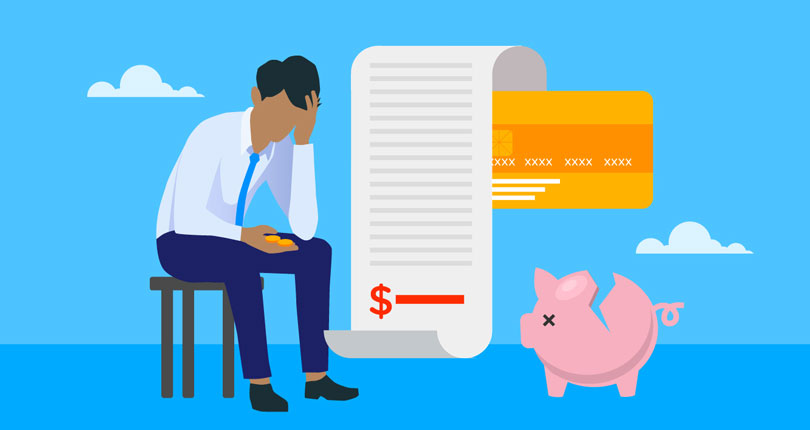Life of Interest: What Americans Pay in Interest Over a Lifetime

Interest can be a hindrance to loans, or it can be a benefit to savings; but for the U.S. Federal Reserve, the discount rate is a vital mechanism for managing the economy.
In 2023, interest rates remained at their highest level in 22 years as the Fed sought to curb generationally high inflation and prevent what would be the third recession since the turn of the century. [1] Financial Times, ‘US Federal Reserve holds interest rates at 22-year high’ https://www.ft.com/content/5b01c471-6289-41a0-9044-97b6df48b507
Previously, research conducted on behalf of Self Financial has worked out how much tax you might pay in your lifetime. But, this study looks at how much interest you could pay on credit card debts, car finances, mortgages, and even student loans.
This research analyzes how much the average American can expect to spend over the course of a lifetime, and how this varies across each U.S. state.
Key statistics:
- The average American will pay $649,067 in interest fees over their lifetime.
- Four U.S. states can expect to pay more than $1m in interest rates, with Hawaii residents ($1.427m) footing the largest interest bill.
- The state that spends the least on interest payments is West Virginia ($311,128).
- Car buyers in Nevada will pay the most in interest ($13,199) on their lifetime auto loans (typically around four cars), while Minnesota drivers ($4,989) will pay the least.
- D.C. residents will pay $32,837 in credit card interest fees, the highest of any state, while Mississippi residents will pay $17,589, the lowest in the country.
How much will the average American pay in interest fees over their lifetime?
Various factors, from the state where you reside to your credit score, affect the amount of interest you’ll pay. No one person’s lifetime interest will be the same as rates and spending fluctuate over time.
It is worth highlighting that ‘a lifetime of interest’ in this research factors in 2023 rates, which are likely to be higher than a decade ago and every single person’s individual interest payments will differ.
Based on this wider research of averages, however, the typical American can expect to pay a total of $649,067 in interest over the course of their lifetime. This figure considers average spending from all states across mortgage repayments, car loans, student loans, and credit card loans.
Around 89% of rates come in the form of mortgage repayments. According to CBRE analysis, the average mortgage-burdened U.S. household can expect to pay 37% more than the average monthly rent for an apartment. [2] CBRE, ‘New Mortgage Payments Now Well Above Multifamily Rents’ https://www.cbre.com/insights/briefs/new-mortgage-payments-now-well-above-multifamily-rents
| Loan | Lifetime interest |
|---|---|
| Mortgage | $579,326 |
| Student loans | $37,563 |
| Credit card loans | $23,933 |
| Car loans | $8,245 |
Lifetime interest payments per state
In total, four U.S. states pass the $1m mark for interest payments. Residents in Hawaii ($1.42m), California ($1.30m), the District of Columbia ($1.08m), and Massachusetts ($1.03m) will all pay seven-figure sums of interest on their mortgages, auto, student, and credit card loans.
Hawaii stands out as the costliest due to its soaring home values. According to Zillow data from 02/29/24, the average house will cost $839,013 — more than $73,000 above the California equivalent. [3] Zillow: ‘Housing Data’ https://www.zillow.com/research/data/#/ The Aloha State’s high cost of living means that residents can expect to pay more than $44,900 annually on interest payments. It should be noted that mortgage interest rates will change over time and homeowners may refinance during the mortgage period, meaning costs could also change.
At the opposite end, West Virginia residents will pay just $311,128 in their lifetime of interest. The Mountain State has the lowest house prices in the U.S., at $155,491, and some of the cheapest credit card interest payments in the country.
Lifetime interest payments by credit score range
As so much of the interest passed on to the consumer depends on their credit score, this research has analyzed how much more consumers can expect to pay in higher or lower credit score ranges. This part of the analysis included mortgage repayments, as well as auto and credit card loans.
However, student loans were excluded from the methodology, as the overwhelming majority (92%) of these are given as federal loans and are therefore unaffected by credit scores. [4] USA Today, ‘Student loan debt: Averages and other statistics in 2024’ https://www.usatoday.com/money/blueprint/student-loans/average-student-loan-debt-statistics/
Mortgage interest payments by credit score
Special subprime mortgages are available for those below the conventional loan threshold of a 620 credit score, but you can expect to pay over $135,000 more over the course of a lifetime with a credit score of 620-639 compared to someone with a 760-850 credit score. [5] What Credit Score Do You Need To Buy A House? https://www.rocketmortgage.com/learn/what-credit-score-is-needed-to-buy-a-house
| Credit Score Range | Interest rate | Mortgage interest (30 years) |
|---|---|---|
| 760-850 | 6.465 % | $549,661 |
| 700-759 | 6.687 % | $568,536 |
| 680-699 | 6.864 % | $583,584 |
| 660-679 | 7.078 % | $601,779 |
| 640-659 | 7.508 % | $638,338 |
| 620-639 | 8.054 % | $684,759 |
Note: Interest rates from Q4 2023.
Auto loan interest payments by credit score
Using interest rates dictated by the following credit score ranges, we can see that those with ‘Super Prime’ credit at the top-end (781+) would pay $15,189 less than those who have 'Deep Subprime’ credit for four cars across an average of 22.6 years of payments.
It should be noted that it is unlikely for someone to stay consistently within ‘Deep subprime’, if, for example, they were consistently paying off car loans on time over their lifetime. This analysis shows no change for the sake of comparison.
If using the average credit score per state, the national average auto loan interest rate sits at around 7.81% interest for auto loans, showing how much more money you could save by improving your credit. [6] Self Financial, ‘How to Build Credit’ https://www.self.inc/blog/how-to-build-credit
| Credit Score Range | Average APR, for used cars | Car loans interest (22.5 years) |
|---|---|---|
| Deep subprime (579 or below) | 21.55% | $20,530.19 |
| Subprime (580-619) | 18.89% | $17,996.07 |
| Nonprime (620-659) | 14.12% | $13,451.80 |
| Prime (660-719) | 9.73% | $9,269.55 |
| Super prime (720 or above) | 7.66% | $7,297.51 |
Credit card interest payments by credit score
This analysis uses the assumption that an individual would pay a 2% minimum on their credit card debts for the sake of comparison between credit score ranges.
There is no set minimum credit score to qualify for credit cards, however, if your score is lower you’ll probably have more difficulty getting accepted. Secured credit cards can be a good option for those with low credit scores.
For many credit card users, this is simply not possible in their current financial situation, therefore the below figures give some indication of the huge difference in interest payments people can pay depending on their credit scores.
| Credit Score Range | Example credit card debt | APR % | Credit card interest (47 years) |
|---|---|---|---|
| Superprime (800+) | $2,917 | 12.8% | $17,551.66 |
| Prime plus (740-799) | $2,917 | 15.1% | $20,705.47 |
| Prime (670-739) | $2,917 | 17.5% | $23,996.41 |
| Near-prime (580-669) | $2,917 | 18.9% | $25,916.12 |
| Subprime and deep subprime (<580) | $2,917 | 19.8% | $27,150.22 |
Methodology
To calculate estimates of lifetime interest, this research reviews typical loan amounts, average interest payments (based on each state’s average credit score), and average repayment terms. This differs per loan type and is broken down in the full methodology below.
Mortgages:
Interest payments were analyzed across a 30 year period with a 20% down payment, both typical terms. The mortgage size was based on the typical home value per state from Zillow, taken 2/29/24. [3] Zillow: ‘Housing Data’ https://www.zillow.com/research/data/#/ APR% was taken from myFICO data in January 2024, the rates used can be seen below. [7] myFICO, ‘Loan Savings Calculator’ https://www.myfico.com/credit-education/calculators/loan-savings-calculator/
| FICO Score | APR |
|---|---|
| 760-850 | 6.465 % |
| 700-759 | 6.687 % |
| 680-699 | 6.864 % |
| 660-679 | 7.078 % |
| 640-659 | 7.508 % |
| 620-639 | 8.054 % |
The average credit score per state was used to calculate estimate interest rates specific to each state. [8] Experian, ‘What Is the Average Credit Score in the US?’ https://www.experian.com/blogs/ask-experian/what-is-the-average-credit-score-in-the-u-s/ Monthly payments were presumed to be equal in each installment using an amortization schedule.
Car loans
Data from the Federal Reserve Bank of New York for Q4 2023 was used to review the average car loan per state. [9] Federal Reserve Bank of New York, ‘Household Debt and Credit’ https://www.newyorkfed.org/microeconomics/databank A repayment term of 70 months was used to calculate how long interest could be paid per car owned. [10] Edmunds, ‘How Long Should a Car Loan Be?’ https://www.edmunds.com/car-loan/how-long-should-my-car-loan-be.html
A lifetime of driving was calculated by starting after college at age 22 [11] Very Well Family, ‘Legal Driving Age by State’ https://www.verywellfamily.com/driving-age-by-state-2611172 up to age 70, when the CDC notes a spike in auto fatalities. [12] CDC, ‘Older Driver Safety’ https://www.cdc.gov/injury/features/older-driver-safety/index.html There isn’t one official age when people should stop driving and this will be an individual experience, but 70 was used for this study due to the elevated risks to senior drivers.
These years were then calculated against the statistic that people change their cars roughly every 12.5 years [13] Reuters ‘U.S. Consumers Keep Vehicles for a Record 12.5 Years on Average’ https://www.reuters.com/business/autos-transportation/us-consumers-keep-vehicles-record-125-years-average-sp-2023-05-15/ which worked out at around 4 cars per lifetime.
Using the state’s average credit score, auto loan interest rates were calculated in a VantageScore analysis by Experian which was used in this study. [14] Experian, ‘State of the Automotive Finance Market Q4 2023’ https://www.experian.com/content/dam/noindex/na/us/automotive/finance-trends/experian-safm-q4-2023.pdf Used car rates were factored instead of new cars as most people buy used. [15] Statista, ‘New and used light vehicle sales in the United States from 2010 to 2022’ https://www.statista.com/statistics/183713/value-of-us-passenger-cas-sales-and-leases-since-1990/ The rates used can be seen in the table below.
| Credit score | Average APR, used car |
|---|---|
| Deep subprime (579 or below) | 21.55% |
| Subprime (580-619) | 18.89% |
| Nonprime (620-659) | 14.12% |
| Prime (660-719) | 9.73% |
| Super prime (720 or above) | 7.66% |
Credit cards
For the purpose of this analysis, credit card loans were assumed to be repaid with minimum payments at 2% monthly until cleared. However, with high interest rates, this means effectively constant credit card debt. Some polls show that 49% of Americans carry credit card debt from month to month, [16] Bankrate, ‘Survey: More Cardholders Carrying Balances, Credit Card Debt’ https://www.bankrate.com/finance/credit-cards/credit-card-debt-survey/ however it is more likely people will eventually pay off their debt and increase their credit score because of it, therefore data should be considered through that lens.
Credit card debt per state came from the Federal Reserve Bank of New York’s Q4 2023 data on consumer spending and debt held. [9] Federal Reserve Bank of New York, ‘Household Debt and Credit’ https://www.newyorkfed.org/microeconomics/databank APR % was based on the state’s credit score range, with percentages coming from the Consumer Financial Protection Bureau’s Quarterly Average APR for ‘general purpose’ cards. The rates can be seen below. While the data here is based on the average credit score in each state, it should be noted that people who carry balances on credit cards could correlate to below-average credit scores. [17] Consumer Financial Protection Bureau, ‘The Consumer Credit Card Market’ https://www.consumerfinance.gov/data-research/research-reports/the-consumer-credit-card-market/
| Credit score range | APR MARGIN |
|---|---|
| Superprime | 12.80% |
| Prime plus | 15.10% |
| Prime | 17.50% |
| Near-prime | 18.90% |
| Subprime and deep subprime | 19.80% |
Student loans
As 92% of student loans are federal, this was the basis for this part of the analysis. [4] USA Today, ‘Student loan debt: Averages and other statistics in 2024’ https://www.usatoday.com/money/blueprint/student-loans/average-student-loan-debt-statistics/ Federal student loan data from September 2023 (the latest available at the time of analysis) was used to calculate interest based on typical loans held. [18] Federal Student Aid, ‘Federal Student Loan Portfolio’ https://studentaid.gov/data-center/student/portfolio#servicer-portfolio-by-repayment-plan Interest rates specific to undergraduates were used of 5.5% [19] Federal Student Aid, ‘Direct Subsidized and Direct Unsubsidized Loans’ https://studentaid.gov/understand-aid/types/loans/subsidized-unsubsidized#what-are-the-current-interest-rates across 20 years, as the average student loan is typically paid off over this period. [20] Education Data Interactive, ‘Average Time to Repay Student Loans’ https://educationdata.org/average-time-to-repay-student-loans
Sources
- [1] Financial Times, ‘US Federal Reserve holds interest rates at 22-year high’ https://www.ft.com/content/5b01c471-6289-41a0-9044-97b6df48b507
- [2] CBRE, ‘New Mortgage Payments Now Well Above Multifamily Rents’ https://www.cbre.com/insights/briefs/new-mortgage-payments-now-well-above-multifamily-rents
- [3] Zillow: ‘Housing Data’ https://www.zillow.com/research/data/#/
- [4] USA Today, ‘Student loan debt: Averages and other statistics in 2024’ https://www.usatoday.com/money/blueprint/student-loans/average-student-loan-debt-statistics/
- [5] What Credit Score Do You Need To Buy A House? https://www.rocketmortgage.com/learn/what-credit-score-is-needed-to-buy-a-house
- [6] Self Financial, ‘How to Build Credit’ https://www.self.inc/blog/how-to-build-credit
- [7] myFICO, ‘Loan Savings Calculator’ https://www.myfico.com/credit-education/calculators/loan-savings-calculator/
- [8] Experian, ‘What Is the Average Credit Score in the US?’ https://www.experian.com/blogs/ask-experian/what-is-the-average-credit-score-in-the-u-s/
- [9] Federal Reserve Bank of New York, ‘Household Debt and Credit’ https://www.newyorkfed.org/microeconomics/databank
- [10] Edmunds, ‘How Long Should a Car Loan Be?’ https://www.edmunds.com/car-loan/how-long-should-my-car-loan-be.html
- [11] Very Well Family, ‘Legal Driving Age by State’ https://www.verywellfamily.com/driving-age-by-state-2611172
- [12] CDC, ‘Older Driver Safety’ https://www.cdc.gov/injury/features/older-driver-safety/index.html
- [13] Reuters ‘U.S. Consumers Keep Vehicles for a Record 12.5 Years on Average’ https://www.reuters.com/business/autos-transportation/us-consumers-keep-vehicles-record-125-years-average-sp-2023-05-15/
- [14] Experian, ‘State of the Automotive Finance Market Q4 2023’ https://www.experian.com/content/dam/noindex/na/us/automotive/finance-trends/experian-safm-q4-2023.pdf
- [15] Statista, ‘New and used light vehicle sales in the United States from 2010 to 2022’ https://www.statista.com/statistics/183713/value-of-us-passenger-cas-sales-and-leases-since-1990/
- [16] Bankrate, ‘Survey: More Cardholders Carrying Balances, Credit Card Debt’ https://www.bankrate.com/finance/credit-cards/credit-card-debt-survey/
- [17] Consumer Financial Protection Bureau, ‘The Consumer Credit Card Market’ https://www.consumerfinance.gov/data-research/research-reports/the-consumer-credit-card-market/
- [18] Federal Student Aid, ‘Federal Student Loan Portfolio’ https://studentaid.gov/data-center/student/portfolio#servicer-portfolio-by-repayment-plan
- [19] Federal Student Aid, ‘Direct Subsidized and Direct Unsubsidized Loans’ https://studentaid.gov/understand-aid/types/loans/subsidized-unsubsidized#what-are-the-current-interest-rates
- [20] Education Data Interactive, ‘Average Time to Repay Student Loans’ https://educationdata.org/average-time-to-repay-student-loans





